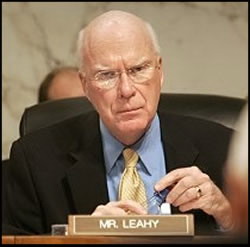Voters’ rights face bipartisan backlash in Congress

PUSH BACK: Sen. Patrick Leahy, D-Vt., is leading efforts to reassert Justice Department authority of state election laws.
By Kenric Ward | Watchdog.org
WASHINGTON, D.C. — Congressional attempts to “fix” the Voting Rights Act after the Supreme Court struck down an antiquated provision would extend the Justice Department’s reach while excluding “non-minorities” from protection.
Identical bills — H.R. 3899 and S. 1945 — have picked up bipartisan support, with 175 co-sponsors.
But instead of reforming the VRA, the legislation abets another administrative power grab, critics say.
Upset that the high court struck down “preclearance” rules granting the Justice Department special authority over election laws in 15 mostly Southern states, Sen. Patrick Leahy, D-Vt., and Rep. James Sensenbrenner, R-Wis., introduced bills to expand the DOJ’s powers.
“The most alarming aspect involves subjective trigger mechanisms,” said Jay DeLancy, executive director of the Voter Integrity Project of North Carolina.
“The federal power grab would then start with five specified complaints being filed in a targeted state within a 15-year period,” he told Watchdog.org. “Acting as both judge and jury, the DOJ would only need to sustain those complaints before awarding itself complete control over that state’s entire electoral process.”
Hans von Spakovsky, a scholar at the conservative Heritage Foundation, said the bills’ “stated purpose is to prevent racial discrimination.”
But cutting through the legislation’s legalistic verbiage, von Spakovsky asserts that Leahy-Sensenbrenner would “make race the predominant factor in the election process.”
Robert Knight, senior fellow for the American Civil Rights Union, agrees.
“(The bills) explicitly exclude ‘non-minorities’ from full protection of the Voting Rights Act … a clear violation of constitutional guarantees of equal treatment under the law,” Knight says.
Before the Supreme Court’s Shelby County (Ala.) v. Holder decision, the DOJ’s Voting Section had power to block state election laws, ranging from voter ID to minor procedural items such as moving a polling place from a school cafeteria to the school library, election attorney J. Christian Adams wrote in National Review.
Sensenbrenner denies any intention of trampling on states’ rights, but Adams said Sensenbrenner-Leahy would immediately return Texas, Georgia, Mississippi and Louisiana to “federal election receivership.” More states would likely follow, Adams said.
TAR HEEL FIGHT: Voter Integrity Project director Jay DeLancy says DOJ attorneys are waging a losing court battle in North Carolina.
“No state will be safe from the federal government if this law passes — not even Wisconsin,” DeLancy said in reference to Sensenbrenner’s land of cheese.
Knight says the Supreme Court’s ruling in Shelby needs no “reform.”
The VRA’s selective preclearance requirement knocked out by the justices was “being abused by a politicized Justice Department,” he observed.
“It could no longer pass constitutional muster because it relied on nearly 50-year-old obsolete data.”
In fits of inconsistency, photo ID laws in “preclearance” states have been routinely challenged by DOJ, while other states freely imposed such statutes.
DOJ lawyers attempt to block photo ID requirements on the presumption they are racially discriminatory. Yet minority voting has increased in states — Georgia and Indiana to name two — where picture identification is mandated.
Without Leahy-Sensenbrenner, Attorney General Eric Holder and his successors will have to fight their battles in open court.
Justice lawyers are currently suing over North Carolina’s election laws. And DeLancy predicts the gambit “will go down in history as an epic failure.”
The Obama administration’s “tired strategy involves putting North Carolina on trial for the civil rights crimes committed during our state’s Democratically controlled Jim-Crow era,” DeLancy said from Raleigh.
“As if that weren’t enough, they will have to prove the non-existence of vote fraud. That will be their undoing.”
Kenric Ward is a national correspondent for Watchdog.org and chief of its Virginia Bureau. Contact him at kenric@watchdogvirginia.org or at (571) 319-9824. @Kenricward







